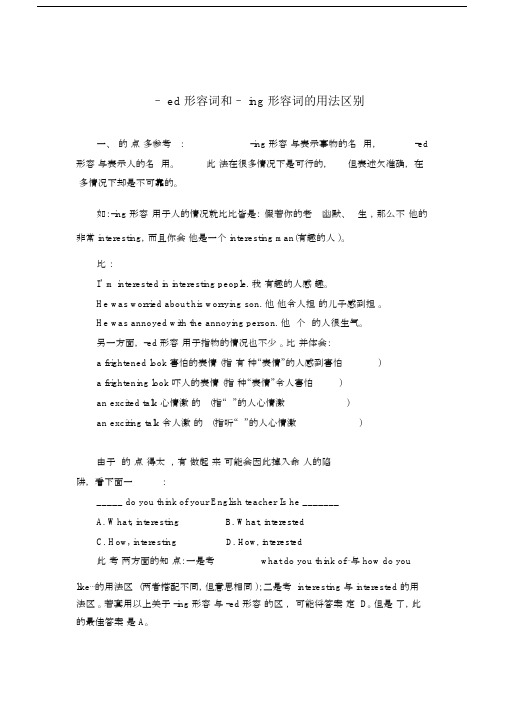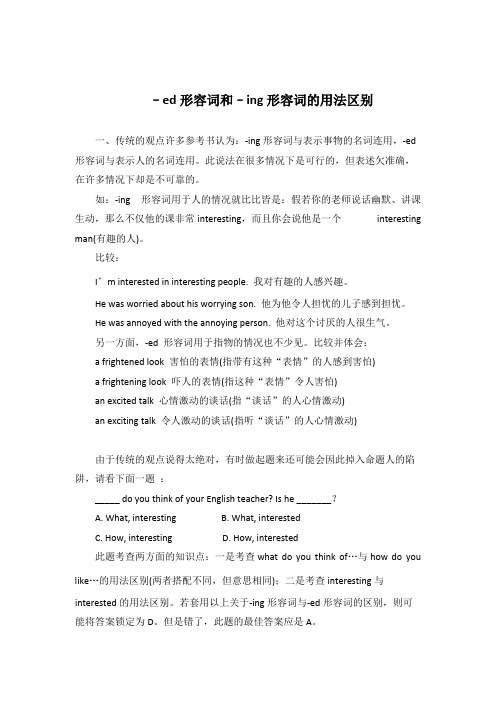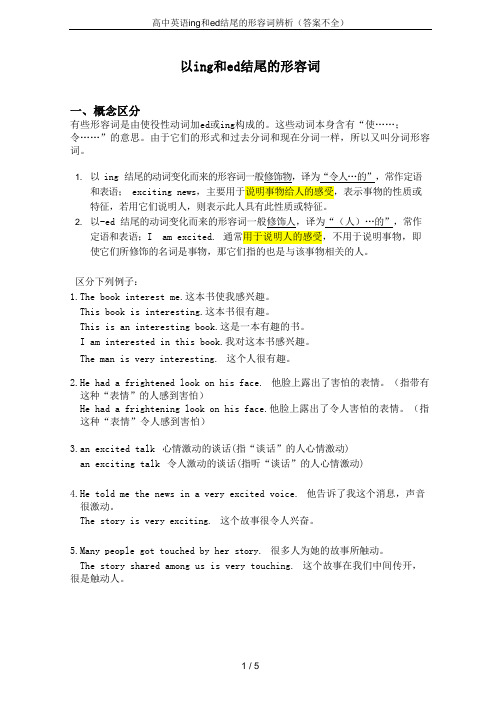(完整版)-ed形容词和-ing形容词辨析和练习
以ed和ing结尾的形容词汇总

以ed和ing结尾的形容词以-ing和-ed结尾形容词的区别用法:1. 以后缀-ed结尾的形容词,如ashamed, delighted, excited, frightened, interested, moved, pleased, surprised, worried等,一般用来形容人的感受,表示“感到......的”,作表语。
如:He had a pleased smile on his face. 他脸上露出了满意的微笑。
He told me the news in a very excited voice. 他告诉了我这个消息,声音很激动。
第一句中的a pleased smile 意为“满意的微笑”,它指的是某人因感到满意发出的微笑;第二句中的 excited voice 指的是“激动的声音”,即指的是带有这种声音的某人感到激动。
原则上,-ed 形容词通常直接用于说明人,若修饰事物,则多为 air(神态), appearance(外貌),cry(哭声), face(表情), voice(声音), mood(情绪)等与显示某人的情感状况的名词。
2. 以后缀-ing结尾的形容词,如delighting, exciting, frightening, interesting, moving, surprising, worrying 等,一般用来形容事或物本身具有的性质,表示“令人......的”,作表语或定语。
如:The story is very interesting. 这个故事很有趣。
The man is very interesting. 这个人很有趣。
3、常见的v.-ing,v.-ed词及短语总结如下:exciting令人兴奋的 excited感到激动的 be excited about对......感到激动surprising 令人惊奇的 surprised感到好奇的 be surprised at对......感到惊奇amazing令人惊讶的. amazed感到惊讶的 be amazed at对......感到惊讶tiring 令人厌倦的 tired感到厌烦的 be tired of对......感到厌烦annoying令人生气的 annoied感到生气的 beannoied with生......的气worrying令人担心的 worried感到担心的 be worried about 为......担心encourage 令人鼓舞的 encouraged 受到鼓舞的interesting 有趣的 interested 感兴趣的astonishing令人惊呆的 astonished 惊呆的moving 令人感动的 moved 感动的frightening令人害怕的 frightened害怕的terrifying令人恐惧 terrified感到恐惧的puzzling 令人困惑不解的 puzzled感到困惑的satisfying令人满意的 satisfied感到满意的boring 令人讨厌的 bored感到厌烦的touching 触动人心的 touched感动的embarrassing令人尴尬的 embarrassed尴尬的。
ed形容词和ing形容词练习

ed形容词和ing形容词练习引言形容词在英语中起着非常重要的作用,它们能够帮助我们更加准确地描述事物,使我们的语言更加生动有力。
在英语中,形容词主要有两种形式,一种是以-ed结尾的形容词,称为过去分词形容词,另一种是以-ing结尾的形容词,称为现在分词形容词。
这两种形容词的用法不同,因此需要加以区分。
本文将从以下几个方面介绍两种形容词的用法和区别:形成规则、词义、修饰范围等。
并提供一些练习题供读者练习。
形成规则以-ed结尾的形容词大多数是以动词过去式+ed构成的,例如:- bored(无聊的)--->bore(使……无聊)的过去式+ed;- confused(困惑的)--->confuse(使……困惑)的过去式+ed;- interested(感兴趣的)--->interest(使……感兴趣)的过去式+ed;- surprised(惊讶的)--->surprise(使……惊讶)的过去式+ed。
- charming(迷人的)--->charm(迷住)+ing;- interesting(有趣的)--->interest(感兴趣)+ing;- exciting(令人激动的)--->excite(激动)+ing;- relaxing(令人放松的)--->relax(放松)+ing。
此外,也有少数以其他形式结尾的-ed和-ing形容词。
例如,以-ful结尾的形容词,如:beautiful(美丽的)、useful(有用的)、colorful(多彩的)等。
以-less结尾的形容词,如:useless(无用的)、hopeless(绝望的)、heartless(无情的)。
以-ive结尾的形容词,如:active(积极的)、creative(有创造力的)、attractive(有吸引力的)。
以-y结尾的形容词,如:happy(快乐的)、lucky(幸运的)、easy(容易的)等。
以ing和ed结尾的形容词用法

以ing和ed结尾的形容词用法英语中,以-ing和-ed结尾的形容词称为分词形容词(participial adjectives),它们常常用于描述人或物的特征或状态。
下面将介绍这两种形容词的用法和区别。
1. 以-ing结尾的形容词以-ing结尾的形容词表示被动、描述状态或特征,常用来形容事物的性质或特点。
它们可以修饰人、物、地点等。
例如:- The stunning sunset painted the sky with vibrant colors.(令人惊叹的日落用绚丽的颜色给天空涂抹上了色彩。
)- I found the book boring and couldn't finish reading it.(我觉得这本书无聊,无法读完。
)- She is a caring teacher who always listens to her students' problems.(她是一位关心学生的老师,总是倾听学生的问题。
)2. 以-ed结尾的形容词以-ed结尾的形容词表示感受、描述人或物的状态,常用来形容人的感受或状态。
例如:- I'm really excited about the upcoming vacation.(我对即将到来的假期感到非常兴奋。
)- He was surprised to see his old friend at the party.(他在聚会上见到老朋友感到很惊讶。
)- The frightened child ran into her mother's arms for comfort.(受到惊吓的孩子跑到妈妈的怀里寻求安慰。
)需要注意的是,有些形容词既可以以-ing也可以以-ed结尾,但含义可能不同。
例如:interested(对某事感兴趣)和 interesting(有趣的)。
在使用时,我们需要根据上下文来确定正确的形容词。
-ing---ed形容词

—ing —ed 形容词用法辨析1)—ing 形容词一般形容“物"本身具有的性质,表示“令人…..”以ing结尾的动词变化而来的形容词一般修饰物,译为“令人…的”,常作定语; exciting news主要用于说明事物,表示事物的性质或特征,若用它们说明人,则表示此人具有此性质或特征.2)—ed形容词一半用来形容“人”的感受,表示“感到….."以—ed结尾的动词变化而来的形容词一般修饰人,译为“(人)…的”,常作表语;通常用于说明人,不用于说明事物,即使它们所修饰的名词是事物,那它们指的也是与该事物相关的人I am excited.3)It's+形容词(—ing)+to do sth.encourage 令人鼓舞的 encouraged 受到鼓舞的interesting 有趣的 interested 感兴趣的astonishing令人惊呆的 astonished 惊呆的surprising 令人惊奇的 surprised感到好奇的moving 令人感动的moved 感动的frightening令人害怕的 frightened害怕的terrifying令人恐惧 terrified感到恐惧的puzzling 令人困惑不解的 puzzled感到困惑的satisfying令人满意的 satisfied感到满意的tiring 令人厌倦的tired感到厌烦的amazing令人惊讶的 amazed感到惊讶的boring 令人讨厌的 bored感到厌烦的exciting令人兴奋的excited感到激动的touching 触动人心的 touched感动的embarrassing令人尴尬的 embarrassed尴尬的enough的用法一、enough作名词时,意思是“足够(的数量或数目)”,可以作主语和宾语。
Enough is as good as feast. 知足者常乐。
1。
enough不能与no连用。
ed形容词及ing形容词辨析及练习.doc

– ed 形容词和– ing 形容词的用法区别一、的点多参考:-ing 形容与表示事物的名用,-ed 形容与表示人的名用。
此法在很多情况下是可行的,但表述欠准确,在多情况下却是不可靠的。
如:-ing 形容用于人的情况就比比皆是:假若你的老幽默、生,那么不他的非常 interesting,而且你会他是一个 interesting man(有趣的人 )。
比:I’ m interested in interesting people. 我有趣的人感趣。
He was worried about his worrying son. 他他令人担的儿子感到担。
He was annoyed with the annoying person. 他个的人很生气。
另一方面, -ed 形容用于指物的情况也不少。
比并体会:a frightened look 害怕的表情 (指有种“表情”的人感到害怕)a frightening look 吓人的表情 (指种“表情”令人害怕)an excited talk 心情激的 (指“ ”的人心情激)an exciting talk 令人激的 (指听“ ”的人心情激)由于的点得太,有做起来可能会因此掉入命人的陷阱,看下面一:_____ do you think of your English teacher Is he _______A. What, interestingB. What, interestedC. How, interestingD. How, interested此考两方面的知点:一是考what do you think of⋯与 how do youlike⋯的用法区 (两者搭配不同,但意思相同 );二是考 interesting 与 interested 的用法区。
若套用以上关于 -ing 形容与 -ed 形容的区,可能将答案定 D。
但是了,此的最佳答案是 A。
二、正确的观点关于 -ing 形容词与 -ed 形容词的区别,比较准确的表述应该是:1.以后缀– ed 结尾的形容词 (如 ashamed, delighted, excited, frightened, interested, moved, pleased, surprised, worried 等)通常用于说明人,不用于说明事物,即使它们所修饰的名词是事物,那它们指的也是与该事物相关的人。
浅析-ed形容词和-ing形容词

浅析-ed形容词和-ing形容词英语中有一部分及物动词如interest(使感兴趣)、please(使高兴)、discourage(使泄气)等,与古汉语中的使役性动词用法相似,使宾语处于某种状态。
这类动词,有相当一部分它们的分词已经形容词化了。
本文就这些形容词化的分词作句子成分的各种情况归纳如下:一、作表语。
-ing形容词作表语,用来表示主语的性质,主语常常由事物充当。
这时的-ing 形容词含有主动的意思,本身具有一种影响力;-ed形容词作表语,用来表示主语所处的状态,主语常常是人,这时的-ed形容词含有被动的意思。
它表达的某种状态的产生是由于外界事物施加影响的结果。
从下面的选择可以看出他们之间的区别。
The film was quite ____and the children were ____to tears. (答案D)A. excited; movedB. exciting; movingC. excited; movingD. exciting;moved二、作定语。
-ing形容词作定语,中心词与其成主动关系,表示中心词所具有的某种性质;-ed形容词作定语,则中心词与其成被动关系,表示中心词所处的状态。
例如:1. The excited people were listening to an exciting speech.2. The puzzled mother of the girl met Dr. Einstein.3. The interesting lad made us alive those days.一般地说,-ing形容词作定语,常修饰“无生命”的事物;-ed形容词作定语常用来修饰“有生命”的事物,如上面的句1,句2。
但也不尽然,如果所修饰的中心词是动作的发出者,-ing 形容词也可以修饰“有生命”的事物,如句3,但-ed形容词修饰“无生命”的事物则很少见。
三、作宾语补足语。
-ed形容词和-ing形容词辨析和练习

–ed形容词和–ing形容词的用法区别一、传统的观点许多参考书认为:-ing形容词与表示事物的名词连用,-ed 形容词与表示人的名词连用。
此说法在很多情况下是可行的,但表述欠准确,在许多情况下却是不可靠的。
如:-ing 形容词用于人的情况就比比皆是:假若你的老师说话幽默、讲课生动,那么不仅他的课非常interesting,而且你会说他是一个interesting man(有趣的人)。
比较:I’m interested in interesting people. 我对有趣的人感兴趣。
He was worried about his worrying son. 他为他令人担忧的儿子感到担忧。
He was annoyed with the annoying person. 他对这个讨厌的人很生气。
另一方面,-ed 形容词用于指物的情况也不少见。
比较并体会:a frightened look 害怕的表情(指带有这种“表情”的人感到害怕)a frightening look 吓人的表情(指这种“表情”令人害怕)an excited talk 心情激动的谈话(指“谈话”的人心情激动)an exciting talk 令人激动的谈话(指听“谈话”的人心情激动)由于传统的观点说得太绝对,有时做起题来还可能会因此掉入命题人的陷阱,请看下面一题:_____ do you think of your English teacher? Is he _______?A. What, interestingB. What, interestedC. How, interestingD. How, interested此题考查两方面的知识点:一是考查what do you think of…与how do you like…的用法区别(两者搭配不同,但意思相同);二是考查interesting与interested的用法区别。
高中英语ing和ed结尾的形容词辨析(答案不全)

以ing和ed结尾的形容词一、概念区分有些形容词是由使役性动词加ed或ing构成的。
这些动词本身含有“使……;令……”的意思。
由于它们的形式和过去分词和现在分词一样,所以又叫分词形容词。
1. 以 ing 结尾的动词变化而来的形容词一般修饰物,译为“令人…的”,常作定语和表语; exciting news,主要用于说明事物给人的感受,表示事物的性质或特征,若用它们说明人,则表示此人具有此性质或特征。
2. 以-ed 结尾的动词变化而来的形容词一般修饰人,译为“(人)…的”,常作定语和表语;I am excited. 通常用于说明人的感受,不用于说明事物,即使它们所修饰的名词是事物,那它们指的也是与该事物相关的人。
区分下列例子:1.The book interest me.这本书使我感兴趣。
This book is interesting.这本书很有趣。
This is an interesting book.这是一本有趣的书。
I am interested in this book.我对这本书感兴趣。
The man is very interesting. 这个人很有趣。
2.He had a frightened look on his face. 他脸上露出了害怕的表情。
(指带有这种“表情”的人感到害怕)He had a frightening look on his face.他脸上露出了令人害怕的表情。
(指这种“表情”令人感到害怕)3.an excited talk 心情激动的谈话(指“谈话”的人心情激动)an exciting talk 令人激动的谈话(指听“谈话”的人心情激动)4.He told me the news in a very excited voice. 他告诉了我这个消息,声音很激动。
The story is very exciting. 这个故事很令人兴奋。
5.Many people got touched by her story. 很多人为她的故事所触动。
- 1、下载文档前请自行甄别文档内容的完整性,平台不提供额外的编辑、内容补充、找答案等附加服务。
- 2、"仅部分预览"的文档,不可在线预览部分如存在完整性等问题,可反馈申请退款(可完整预览的文档不适用该条件!)。
- 3、如文档侵犯您的权益,请联系客服反馈,我们会尽快为您处理(人工客服工作时间:9:00-18:30)。
–ed形容词和–ing形容词的用法区别一、传统的观点许多参考书认为:-ing形容词与表示事物的名词连用,-ed 形容词与表示人的名词连用。
此说法在很多情况下是可行的,但表述欠准确,在许多情况下却是不可靠的。
如:-ing 形容词用于人的情况就比比皆是:假若你的老师说话幽默、讲课生动,那么不仅他的课非常interesting,而且你会说他是一个interesting man(有趣的人)。
比较:I’m interested in interesting people. 我对有趣的人感兴趣。
He was worried about his worrying son. 他为他令人担忧的儿子感到担忧。
He was annoyed with the annoying person. 他对这个讨厌的人很生气。
另一方面,-ed 形容词用于指物的情况也不少见。
比较并体会:a frightened look 害怕的表情(指带有这种“表情”的人感到害怕)a frightening look 吓人的表情(指这种“表情”令人害怕)an excited talk 心情激动的谈话(指“谈话”的人心情激动)an exciting talk 令人激动的谈话(指听“谈话”的人心情激动)由于传统的观点说得太绝对,有时做起题来还可能会因此掉入命题人的陷阱,请看下面一题:_____ do you think of your English teacher? Is he _______?A. What, interestingB. What, interestedC. How, interestingD. How, interested此题考查两方面的知识点:一是考查what do you think of…与how do you like…的用法区别(两者搭配不同,但意思相同);二是考查interesting与interested 的用法区别。
若套用以上关于-ing形容词与-ed形容词的区别,则可能将答案锁定为D。
但是错了,此题的最佳答案应是A。
二、正确的观点关于-ing形容词与-ed形容词的区别,比较准确的表述应该是:1. 以后缀–ed结尾的形容词(如ashamed, delighted, excited, frightened, interested, moved, pleased, surprised, worried等)通常用于说明人,不用于说明事物,即使它们所修饰的名词是事物,那它们指的也是与该事物相关的人。
如:He had a pleased smile on his face.他脸上露出了满意的微笑。
He told me the news in a very excited voice.他声音很激动地告诉了我这个消息。
第一句中的a pleased smile 意为“满意的微笑”,它指的是某人因感到满意发出的微笑;第二句中的 a very excited voice 指的是“很激动的声音”,即指的是某人因很激动而发生那样的声音。
原则上,-ed 形容词通常直接用于说明人,若修饰事物,则多为air(神态), appearance(外貌), cry(哭声), face(表情), voice(声音), mood(情绪)<'Times New Roman'">), mood(等显示某人的情感状况的名词。
2. 以后缀-ing 结尾的形容词(如delighting, exciting, frightening, interesting, moving, surprising, worrying 等)主要用于说明事物,表示事物的性质或特征,若用它们说明人,则表示此人具有此性质或特征。
如:The story is very interesting. 这个故事很有趣。
The man is very interesting. 这个人很有趣。
请再比较并体会以下句子:He is frightened. 他很害怕。
He is frightening. 他很吓人。
He has a frightened look on his face. 他脸上带有惊恐的神情。
He has a frightening look on his face. 他脸上带有吓人的神情。
I read an interested expression on his face. 我看到他脸上露出一种感兴趣的表情。
I read an interesting expression on his face. 我看到他脸上露出一种有趣的表情。
三、学练结合请做做以下试题,看你是否能克服原来的思维定势,能否跳出命题人的陷阱:1. Laws that punish parents for their little children’s actions against the laws get parents _____.A. worriedB. to worriedC. worryingD. worry2. The little boy is n’t getting on well in maths and worse still, he is even unwilling to go to school. With her son _____, she feels very ______.A. disappointing;worryingB. disappointing;worriedC. disappointed;worriedD. disappointed;worrying3. After the Anti-terrorist War, the American soldiers returned home, ______.A. safe but tiredB. safely but tiredC. safe and tiringD. safely and tiring4. As we all know, typing is a ______ job to a ______ heart.A. tired; tiredB. tired; tiringC. tiring; tiredD. tiring; tiring5. Poor boy! His________ looks and ________hands suggested he was very afraid.A. frightful; trembling B. frightened; tremblingC. frightening; trembledD. frightened; trembly答案与解析:1. 选A。
句中的that punish…the law是定语从句。
句意是:因为他们小孩的违法行为而惩罚其父母,这样的法律使得做父母的感到忧虑。
表示人“感到忧虑的”用由过去分词转换而来的形容词。
2. 选B。
句意是:由于她的儿子令人失望,她感到非常烦恼。
表示“令人……的”用-ing 形容词;表示“感到……的”用-ed形容词。
3. 选A。
此题一方面考查形容词作状语(。
此题一方面考查形容词作状语(当形容词用作状语时,表示意义上的增补,和句子主语在逻辑上有主谓关系),另一方面考查形容词tiring与tired的用法区别,此处填tired表示“人感到疲惫的”,即选A。
4. 选C。
第一空填tiring,表示“使人劳累的”;第二空填tired,表示“感到劳累的”。
5. 选B。
第一空填frightened,其意为“感到害怕的”;第二空填trembling 表示动作的进行。
也就是说,frightened说明主语因……而产生的情绪反应,从而影响到人的身体部位……trembling。
ed形式及常见短语与ing 形式形容词归纳excited (be ~d about) / excitingsurprised (be ~d at) //surprisingamazed (be ~d at) //amazingembarrassed(be ~ed in) //embarrassingencouraged(be ~ed at / by) / encouragingfrustrated (be ~d of) / frustratinginterested (be ~ed in) / interestingthrilled (be ~ed at) / thrillingterrified (be terrified at/ of / with) / terrifyingpleased (be ~d with) / pleasing, = pleasantsatisfied(be satisfied with) / satisfyingfrightened (be ~ed at / of ) / frighteningtired (be ~d of) / tiringbored (be ~d with) / boringrelaxed (无固定搭配) / relaxingfascinated (be ~d by) / fascinatingannoyed (be ~ed with) / annoyingmoved (be ~d by) / movingworried (be worried about) / worryingconfused (be confused about) / confusing练习:一用括号内所给动词的-ed形式或-ing形式填空1. The children were ____after the trip. (tire)2. The trip was____. (tire)3. The ____children went to bed early after the trip. (tire)4. The ____trip lasted a whole day. (tire)5. The trip made the children____. (tire)6. The bad weather made the trip____. (tire)7. Tom’s parents are ____ at his ____ results of the exams.(disappoint)8. ____and angry, he left the meeting-room. (disappoint)9. It is ____that he didn’t pass the examination.(disappoint)10. When hearing the____ news that Michael Jackson passed away, they were____to look at each other. (surprise)11. He was ____ about his ____ son. (worry)12. I'm not ____with his interpretation of this sentence. (satisfy)13. He was ____with the ____person. (annoy)14. A police car appeared on the road, the thief had a____ look on his face. (frighten)15. The situation here is ____and we are____. (encourage)答案:1. tired2. tiring3. tired4. tiring5. tired6. tiring7. disappointed, disappointing)8. Disappointed9. disappointing10. surprising; surprised 11. worried; worrying 12. satisfied 13. annoyed; annoying 14. frightened15. encouraging; encouraged二巩固练习:1. The wet weather will continue tomorrow when a cold front ______to arrive.(2008?全国卷I)A. is expectedB. is expectingC. expectsD. will be expected2. —Do you know if Terry will go camping this weekend? (2008?上海高考)—Terry? Never! He _____ tents and fresh air!A. has hatedB. hatedC. will hateD. hates3. By the time he realizes he ____ into a trap, it’ll be too late for him to do anything about it. (2008?山东高考)A. walksB. walkedC. has walkedD. had walked4. So far this year we ______ a fall in house prices by between 5 and 10 percent. (2008?福建高考)A. sawB. seeC. had seenD. have seen5. Some of the people who ________ to the party can’t come now. (2008? 烟台模拟)A. had been invitedB. have been invitedC. are invitedD. invited6. Laws that punish parents for their lit tle children’s actions against the laws get parents _____. A. worried B. to worried C. worryingD. worry7. The little boy isn’t getting on well in maths and worse still, he is even unwilling to go to school. With her son _____, she feels very ______.A. disappointing; worryingB. disappointing; worriedC. disappointed; worriedD. disappointed; worrying8. After the Anti-terrorist War, the American soldiers returned home, ______.A. safe but tiredB. safely but tiredC. safe and tiringD. safely and tiring9. As we all know, typing is a ______ job to a ______ heart.A. tired; tiredB. tired; tiringC. tiring; tiredD. tiring; tiring10. Poor boy! His________ looks and ________hands suggested he was very afraid.A. frightful; tremblingB. frightened; tremblingC. frightening; trembledD. frightened; trembly11._____ do you think of your English teacher? Is he _______?A. What, interestingB. What, interestedC. How, interestingD. How, interested 答案:1-5 ADCDB 6-11ABACBA。
